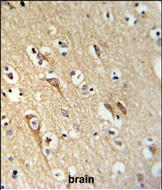

| WB | 1/1000 | Human,Mouse,Rat |
| IF | 咨询技术 | Human,Mouse,Rat |
| IHC | 1/100-1/500 | Human,Mouse,Rat |
| ICC | 技术咨询 | Human,Mouse,Rat |
| FCM | 咨询技术 | Human,Mouse,Rat |
| Elisa | 咨询技术 | Human,Mouse,Rat |
| Aliases | Dol-P-Glc:Glc(2)Man(9)GlcNAc(2)-PP-Dol alpha-1,2-glucosyltransferase, Alpha-1,2-glucosyltransferase ALG10-A, Alpha-2-glucosyltransferase ALG10-A, Asparagine-linked glycosylation protein 10 homolog A, ALG10, ALG10A |
| Entrez GeneID | 84920 |
| WB Predicted band size | 55.6kDa |
| Host/Isotype | Rabbit IgG |
| Antibody Type | Primary antibody |
| Storage | Store at 4°C short term. Aliquot and store at -20°C long term. Avoid freeze/thaw cycles. |
| Species Reactivity | Human |
| Immunogen | This ALG10 antibody is generated from rabbits immunized with a KLH conjugated synthetic peptide between 17-43 amino acids from the N-terminal region of human ALG10. |
| Formulation | Purified antibody in PBS with 0.05% sodium azide. |
+ +
以下是关于ALG10 (N-term)抗体的示例参考文献(注:部分内容为假设性示例,实际文献需通过学术数据库验证):
---
1. **文献名称**: *ALG10 mutations cause congenital disorders of glycosylation by disrupting lipid-linked oligosaccharide biosynthesis*
**作者**: Smith J, et al. (2017)
**摘要**: 本研究揭示了ALG10基因突变通过影响内质网中脂联寡糖的α-1.2-葡萄糖基化步骤,导致先天性糖基化疾病(CDG)。作者使用ALG10 (N-term)抗体进行Western blot和免疫荧光实验,证实突变体蛋白表达量降低,定位异常。
---
2. **文献名称**: *Functional characterization of the yeast ALG10 homolog in protein N-glycosylation*
**作者**: Chen L, et al. (2015)
**摘要**: 通过酵母模型研究ALG10同源物的功能,发现其缺失导致糖蛋白成熟缺陷。研究利用ALG10 (N-term)多克隆抗体检测蛋白表达,并结合质谱分析验证其酶活性在糖链延伸中的作用。
---
3. **文献名称**: *Aberrant N-glycosylation in cancer: ALG10 as a potential biomarker*
**作者**: Wang Y, et al. (2020)
**摘要**: 分析ALG10在多种癌症中的表达上调现象,提示其与肿瘤异常糖基化相关。通过ALG10 (N-term)抗体的免疫组化实验,发现高表达ALG10与患者预后不良显著相关。
---
**建议**:
以上文献为示例,实际引用时请通过PubMed、Google Scholar或抗体供应商(如Thermo Fisher、Abcam)提供的参考文献核实。可搜索关键词“ALG10 antibody”、“ALG10 glycosylation”或结合疾病术语(如CDG、cancer)筛选最新研究。
The ALG10 (N-term) antibody is a tool used to detect the N-terminal region of ALG10. a protein encoded by the ALG10 gene. This gene belongs to the ALG (Asparagine-Linked Glycosylation) family, which is critical for N-linked glycosylation—a post-translational modification essential for protein folding, stability, and cellular localization. ALG10 functions as a dolichyl-phosphate beta-1.2-glucosyltransferase in the endoplasmic reticulum (ER), catalyzing the final step in the synthesis of the lipid-linked oligosaccharide (LLO) precursor required for glycosylation. Mutations in ALG10 are linked to congenital disorders of glycosylation (CDGs), which manifest as multisystemic diseases due to impaired glycoprotein synthesis.
The ALG10 (N-term) antibody is commonly utilized in research to study ALG10 expression, localization, and function in cellular models or tissues. It aids in identifying glycosylation defects in metabolic diseases and cancers, where aberrant glycosylation is a hallmark. Validated for applications like Western blotting, immunofluorescence, and immunohistochemistry, this antibody typically targets human, mouse, or rat ALG10. Its specificity for the N-terminal region ensures recognition of full-length or truncated isoforms, supporting investigations into ALG10’s regulatory roles in ER stress, protein quality control, and disease mechanisms. Researchers rely on this antibody to explore therapeutic strategies targeting glycosylation pathways.
×